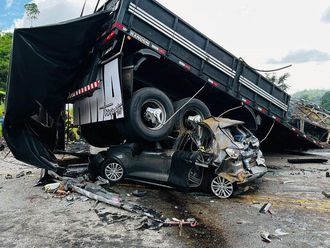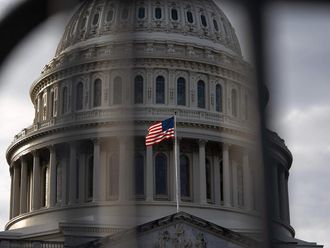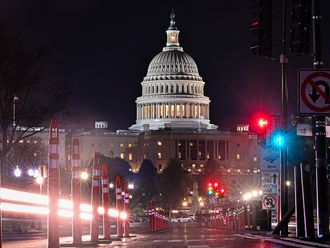Miami: Hurricane Matthew, the most powerful storm to tear across the Caribbean since 2007, picked up strength overnight as it barrelled towards Jamaica and Haiti, US monitors said on Saturday.
Matthew, swirling off the northern coast of Colombia and Venezuela and forecast to make a turn towards the northwest, was packing winds of 260 kilometres per hour with higher gusts, the National Hurricane Centre (NHC) said in its 0600 GMT bulletin.
That makes it the strongest storm on the 1-5 Saffir-Simpson scale, and the most powerful Caribbean storm since Hurricane Felix in 2007, the Miami-based monitor said.
The centre of Matthew was located 144 kms northwest of Punta Gallinas, Colombia, and 688 kms southeast of Kingston, Jamaica, the NHC said.
The storm is currently moving towards the west at 11.2 kms per hour, but is expected to turn towards the northwest on Saturday.
Matthew became a Category 1 hurricane on Thursday afternoon, then swiftly rose to Category 4 a day later. Late Friday it strengthened into a powerful Category 5 storm.
The NHC’s long-term forecast has Matthew hitting the southern coast of Cuba late Monday or early Tuesday after tearing across Jamaica.
Hurricane Felix killed some 150 people and left thousands homeless when it slammed the Caribbean coast of Nicaragua in September 2007.
Jamaica and southern Haiti were preparing for heavy rain and flooding as the storm headed in their direction. Forecasters said that 25-38 centimetres of rain could fall across the region.
A hurricane watch was in effect for Jamaica, and a tropical storm watch was in effect in Haiti from the southern part of the border with the Dominican Republic to the capital Port-au-Prince, the NHC said.
In Haiti, authorities warned residents of the country’s southern islands that they were “first at risk,” and urged them to prepare.
“We invite them to secure the area surrounding their homes and begin to stock up on water and food,” Edgar Celestin, a spokesman for the Haitian civil protection agency, told AFP.
In Jamaica, Local Government Minister Desmond McKenzie told The Star newspaper that Prime Minister Andrew Holness had instructed authorities to “go full speed ahead” with efforts to prepare for and respond to the hurricane.
That includes placing some 2,000 homeless people in shelters, McKenzie told the newspaper.
Separately, the US embassy in Jamaica said it will be closed Monday and Tuesday for consular services “due to the anticipated effects of Hurricane Matthew.”
Heavy rain from Matthew “may produce life-threatening flash flooding and mud slides” in the affected area, the NHC warned, saying isolated areas could be lashed with up to 25 inches of rain.
Ocean swells with the potential to cause dangerous currents and rip tides are also possible over the next two days in coastal regions of Puerto Rico, Venezuela, Aruba, Bonaire, Curacao, Colombia, the Dominican Republic and Haiti.
Colombia issued a high-level alert for much of its northern coast, warning of “extremely dangerous life-threatening conditions” and of giant waves up to five meters high.
The Atlantic hurricane season normally runs from June 1 to November 30, but this year’s first hurricane, Alex, formed in January.












